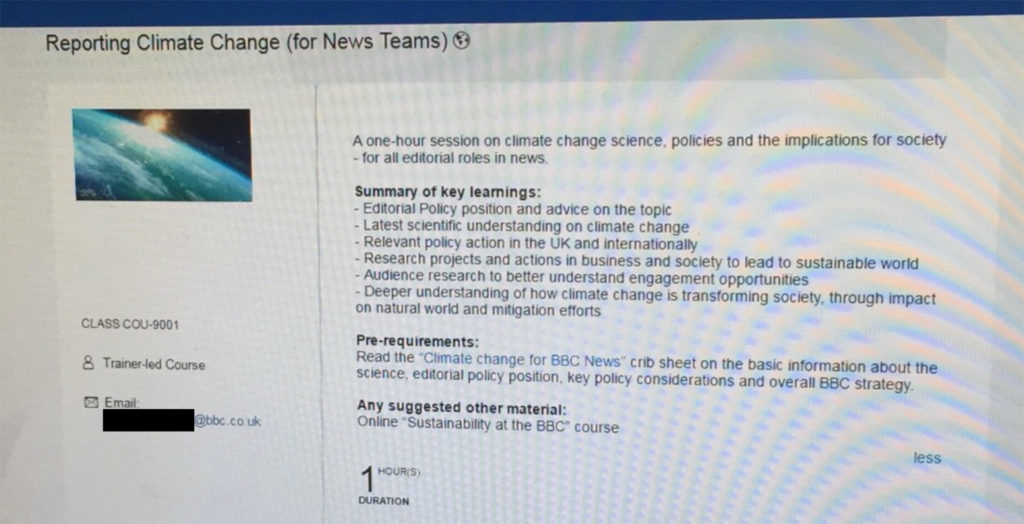
Image: Katharine Hayhoe: Bridging the Climate Change Divide
In yet another example of the squelching of scientific debate by those advocating for the position that dangerous anthropogenic global warming is a cosmic threat, Dr. Katharine Hayhoe, climate scientist, has been found twitter-blocking fellow scientists who have the audacity to ask her to support her views on the greenhouse effect.
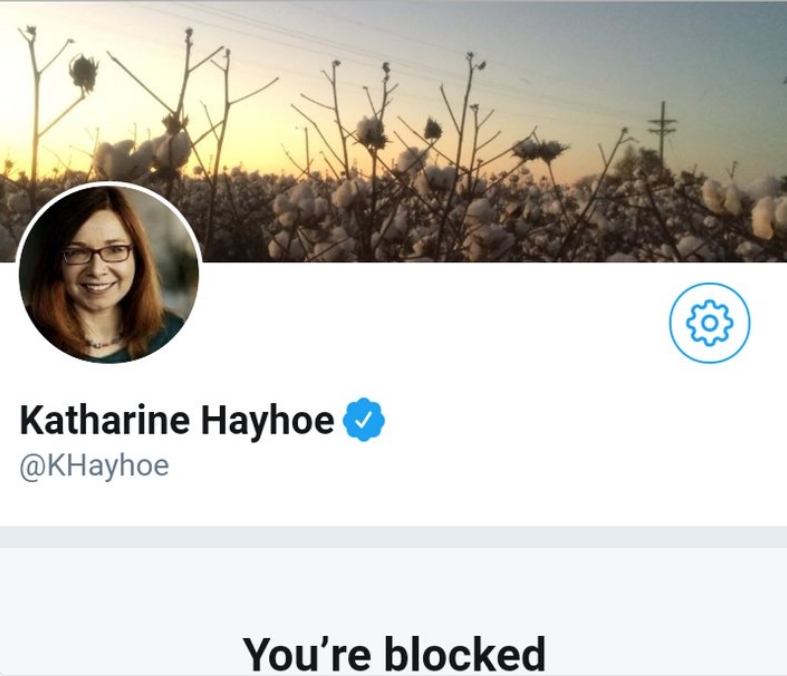
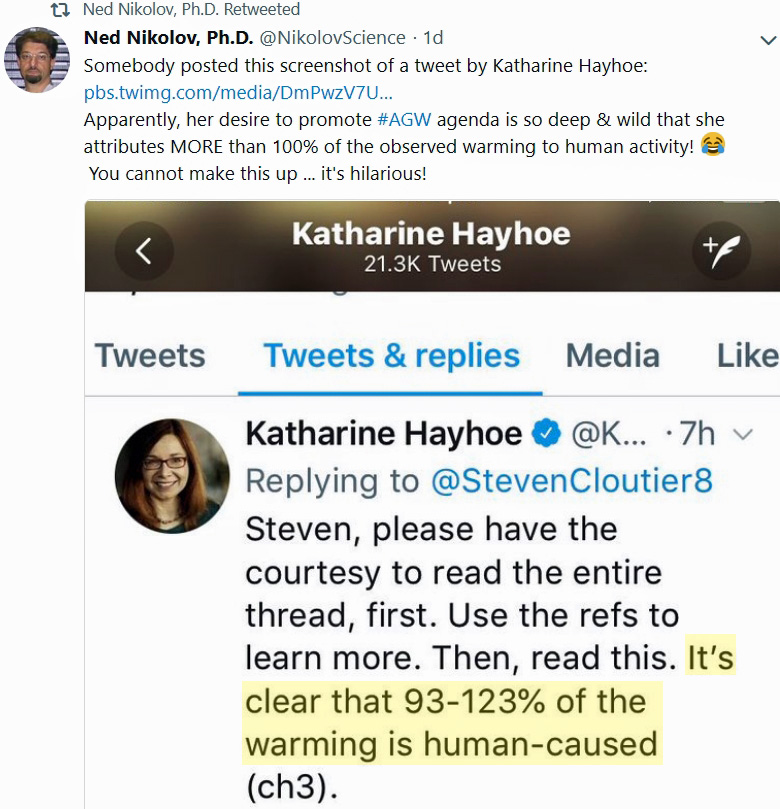
Image Source: https://twitter.com/NikolovScience
For over a year now, physical scientist Dr. Ned Nikolov has been enthusiastically debating anyone and everyone on his twitter page who wishes to challenge his conclusions on the mechanisms that set macro planetary temperatures.
Frequently referencing the comprehensive explanations found in their 2017 scientific paper, New Insights on the Physical Nature of the Atmospheric Greenhouse Effect Deduced from an Empirical Planetary Temperature Model (Nikolov and Zeller, 2017), Dr. Nikolov has garnered a reputation for responding openly and directly to each serious query or objection to his views.
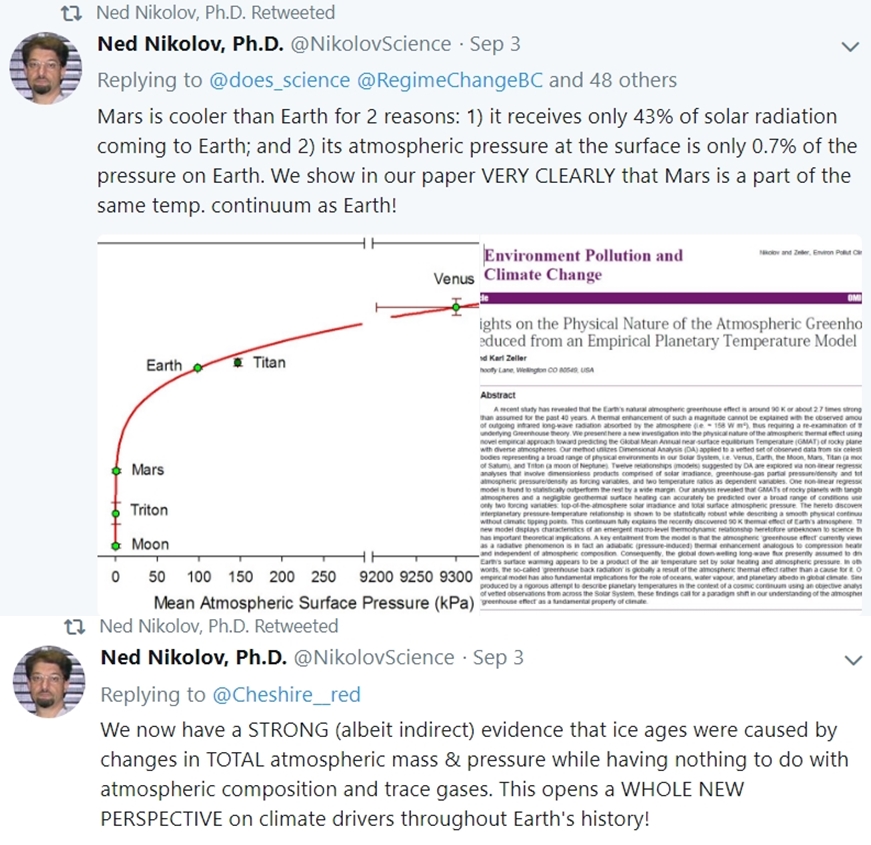
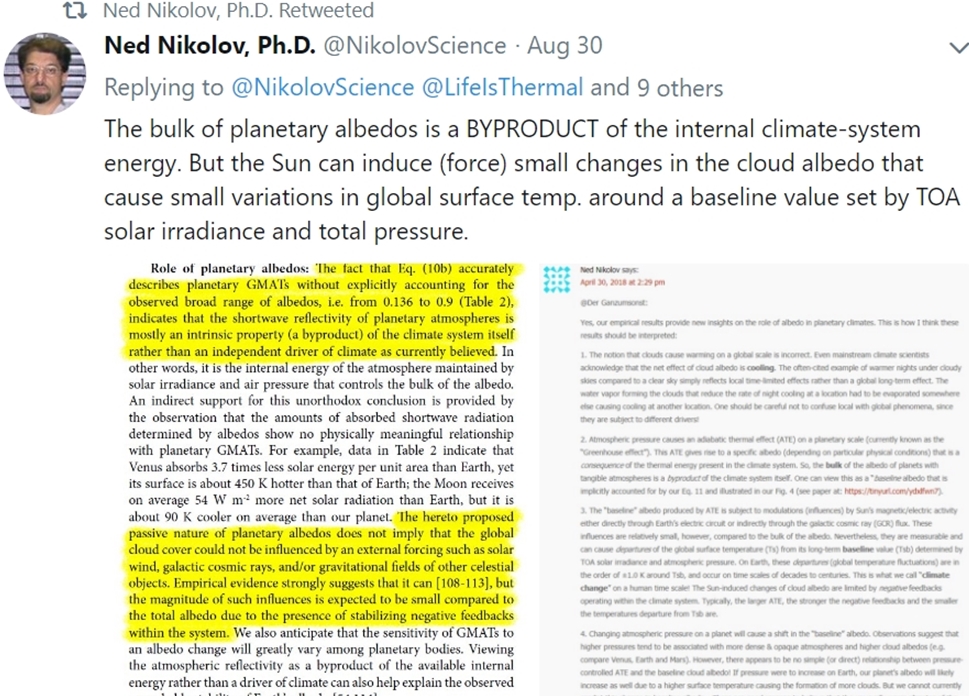
Casual observers of his twitter page may notice that Nikolov does not shrink away from defending his theories. He invites debate and challenges to his climate theories.
The intriguing empirical planetary temperature model he espouses is one of the featured presentations at this weekend’s Basic Science of a Changing Climate conference in Porto.
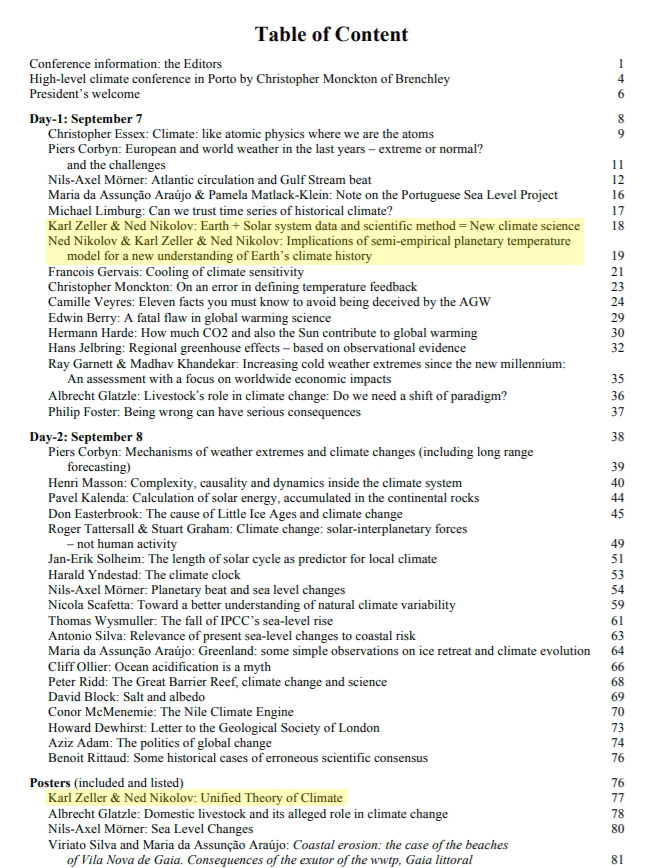
Image Source: Porto Conference 2018
In direct contrast to the openness to debating ideas and the scientific method, Dr. Katharine Hayhoe, a climate scientist who believes that up to 123% of climate change is caused by humans, has taken to twitter-blocking scientists like Dr. Nikolov. Why? Because he dared to ask her to discuss the basics of the greenhouse effect with him.
Hayhoe apparently finds it threatening to debate scientists who disagree with her about the role of greenhouse gases or human activity in climate change.
Is silencing those who challenge one’s views now accepted practice among climate scientists? Apparently so.
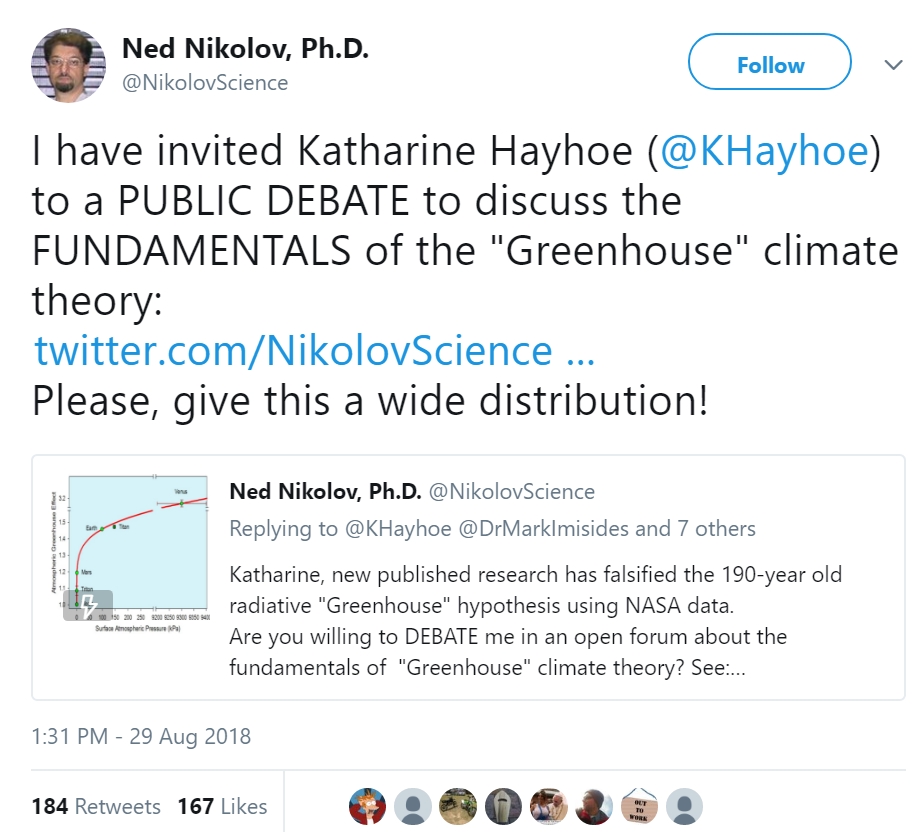
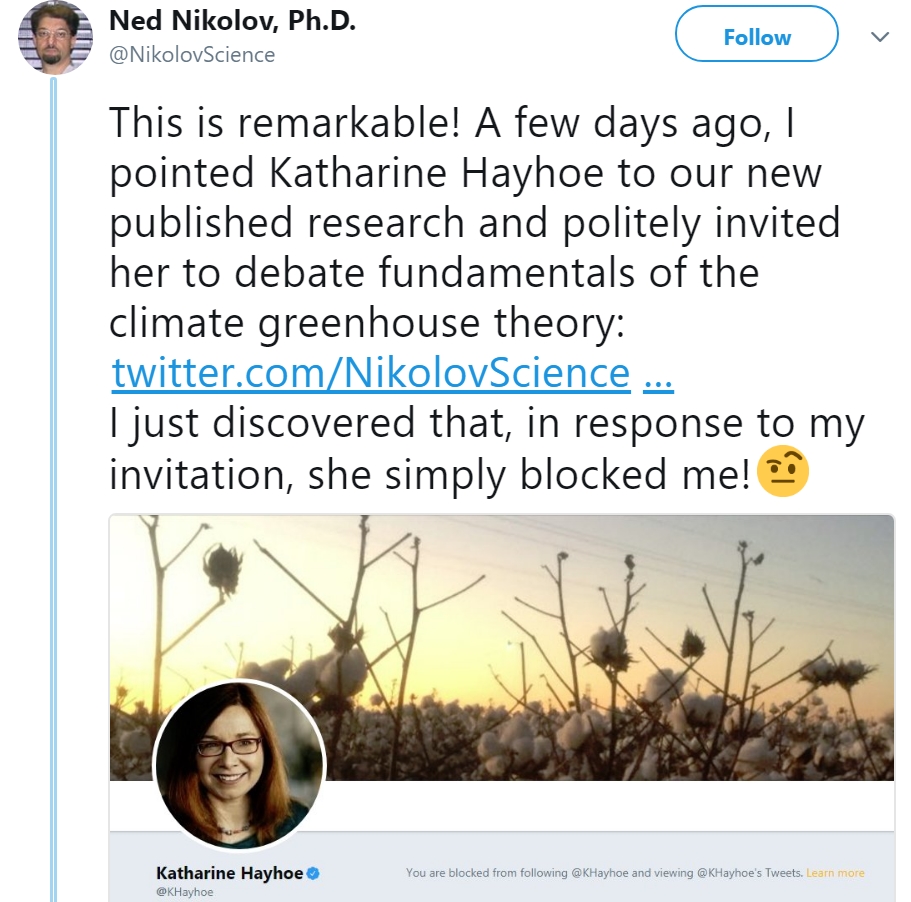
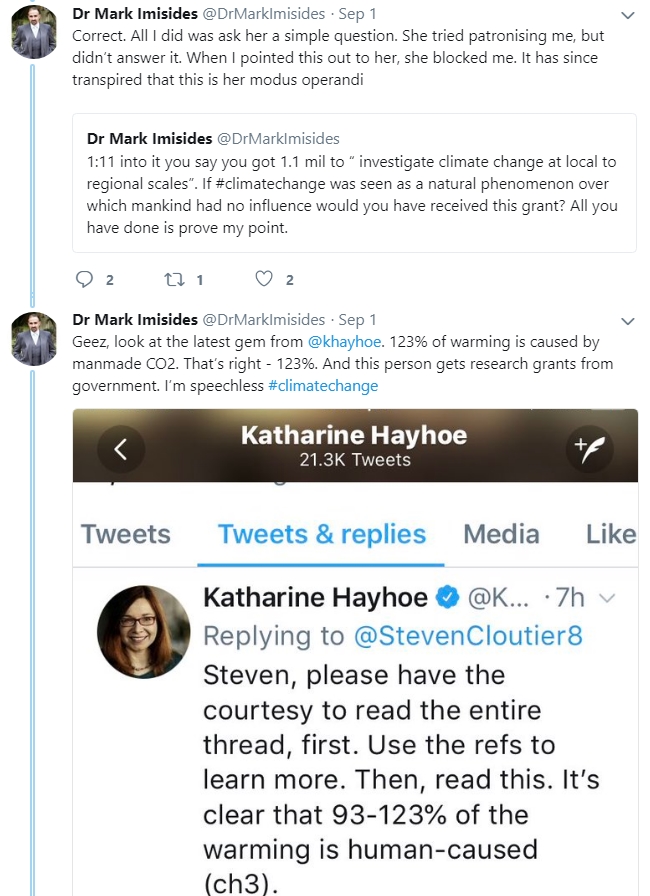
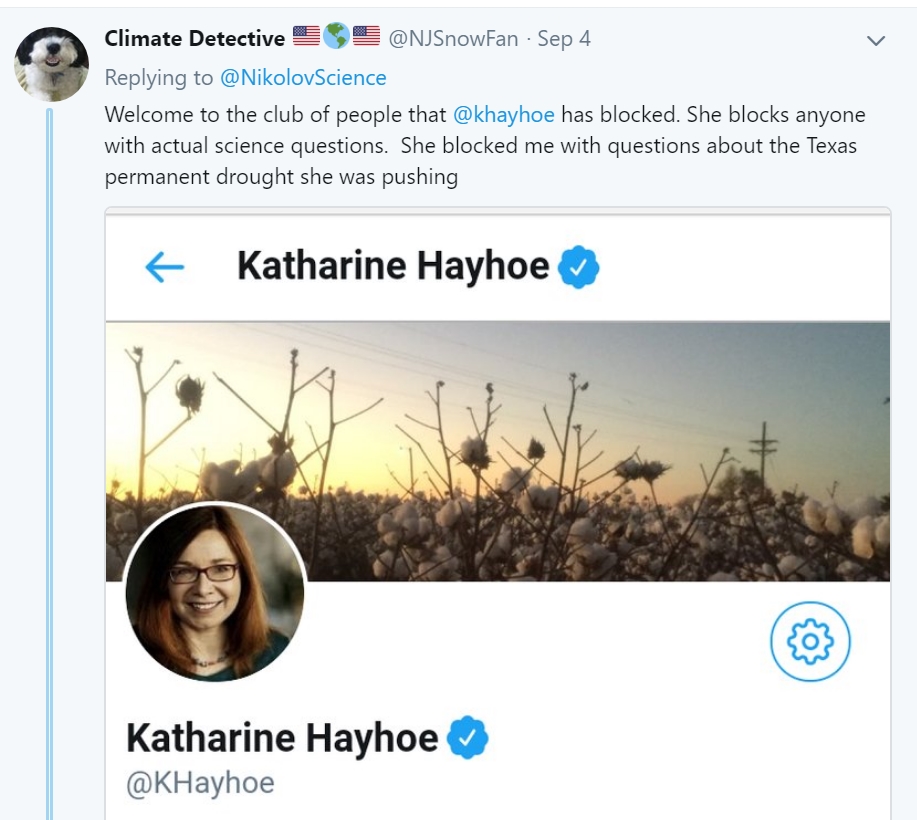
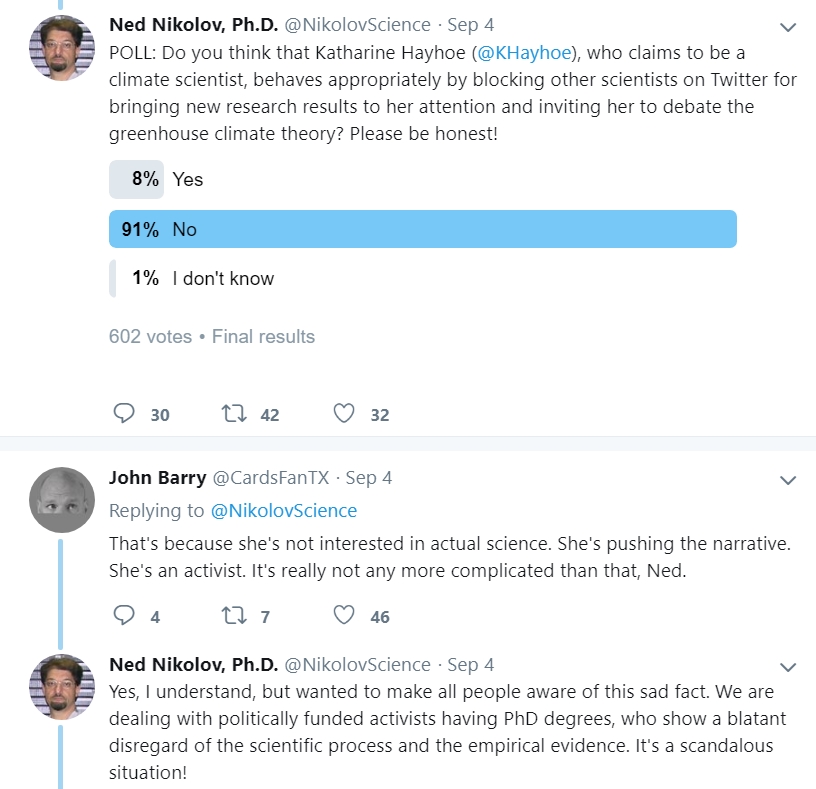
Ref.: http://notrickszone.com/2018/09/06/dr-katharine-hayhoe-blocks-scientists-who-invite-her-to-debate-the-role-of-co2-in-climate-change/
More censorship from the jolly happy, smirking, “green” left ..
BBC Issues New Guidelines To Shut Down Debate On Climate Change
By Paul Homewood
h/t Robin Guenier et al
Carbon Brief has obtained details of new BBC guidance on how to handle climate issues:
The BBC, one of the world’s largest and most respected news organisations, has issued formal guidance to its journalists on how to report climate change.
Carbon Brief has obtained the internal four-page “crib sheet” sent yesterday to BBC journalists via an email from Fran Unsworth, the BBC’s director of news and current affairs. The crib sheet includes the BBC’s “editorial policy” and “position” on climate change.
All of the BBC’s editorial staff have also been invited to sign up for a one-hour “training course on reporting climate change”. Carbon Brief understands this is the first time that the BBC has issued formal reporting guidance to its staff on this topic.
The move follows a ruling earlier this year by Ofcom, the UK’s broadcasting regulator, which found that BBC Radio 4’s flagship current-affairs programme Today had breached broadcasting rules by “not sufficiently challenging” Lord Lawson, the former Conservative chancellor.
Lawson, who chairs a UK-based climate-sceptic lobby group, had made false claims about climate change in an interview on Today in August 2017. Before Ofcom published its ruling in April, the BBC had already apologised for breaching its general editorial guidelines during the Lawson interview.
The broadcaster has faced repeated criticism over the past decade for enabling “false balance” on the topic of climate change, as well as for failing to fully implement the recommendations of the BBC Trust’s 2011 review into the “impartiality and accuracy of the BBC’s coverage of science”.
This is the email sent by Fran Unsworth to BBC journalists yesterday:
Dear all
After a summer of heatwaves, floods and extreme weather, environment stories have become front of mind for our audiences. There are a number of important related news events in the coming months – including the latest report from the UN Intergovernmental Panel on Climate Change and Green Great Britain Week in October – so there will be many more stories to cover. Younger audiences, in particular, have told us they’d like to see more journalism on the issue.
With this in mind, we are offering all editorial staff new training for reporting on climate change. The one hour course covers the latest science, policy, research, and misconceptions to challenge, giving you confidence to cover the topic accurately and knowledgeably.
Please book now by choosing a time from MyDevelopment (you’ll be prompted to login first), searching ‘reporting climate change’ on MyDevelopment, or emailing XXXXXX@bbc.co.uk to set up a tailored session for your team.
In the meantime, you can read the Climate Change for BBC News crib sheet, and the Analysis and Research website by searching ‘climate change’ which cover the basics.
I hope you find the training useful.
Fran
If a journalist clicks on the email’s link to book a place on the course, they are taken to this page on the BBC intranet:
(To avoid the risk of personal abuse or intimidation, Carbon Brief has decided to redact the email address of the BBC employee running the course. Carbon Brief can confirm, though, that the individual is not one of the BBC journalists who report on climate change.)
The crib sheet, below, includes a summary of the “basics” on climate science, the BBC’s “editorial policy” and “position” on climate change, and a precis of domestic climate policies in the UK as well as at the international level.
This is the document’s wording for the BBC’s “editorial policy” and “position” on climate change:
Editorial Policy
Climate change has been a difficult subject for the BBC, and we get coverage of it wrong too often. The climate science community is clear that humans have changed the climate, but specifically how is more difficult to evidence. For instance, there is very high confidence that there will be more extreme events – floods, droughts, heatwaves etc. – but attributing an individual event, such as the UK’s winter floods in 2013/2014, to climate change is much less certain.
We must also be careful to distinguish between the statements. For example: “Climate change makes this kind of event both more frequent and more severe,” and “Climate change caused this event”. The former uses previous scientific evidence to say ‘it is likely’ the event is the result of climate change, whereas the latter may be making an assertion without the proof to back it up.
What’s the BBC’s position?
- Man-made climate change exists: If the science proves it we should report it. The BBC accepts that the best science on the issue is the IPCC’s position, set out above.
- Be aware of ‘false balance’: As climate change is accepted as happening, you do not need a ‘denier’ to balance the debate. Although there are those who disagree with the IPCC’s position, very few of them now go so far as to deny that climate change is happening. To achieve impartiality, you do not need to include outright deniers of climate change in BBC coverage, in the same way you would not have someone denying that Manchester United won 2-0 last Saturday. The referee has spoken. However, the BBC does not exclude any shade of opinion from its output, and with appropriate challenge from a knowledgeable interviewer, there may be occasions to hear from a denier.
- There are occasions where contrarians and sceptics should be included within climate change and sustainability debates. These may include, for instance, debating the speed and intensity of what will happen in the future, or what policies government should adopt. Again, journalists need to be aware of the guest’s viewpoint and how to challenge it effectively. As with all topics, we must make clear to the audience which organisation the speaker represents, potentially how that group is funded and whether they are speaking with authority from a scientific perspective – in short, making their affiliations and previously expressed opinions clear.
https://www.carbonbrief.org/exclusive-bbc-issues-internal-guidance-on-how-to-report-climate-change
The fact that Unsworth begins her letter:
“After a summer of heatwaves, floods and extreme weather, environment stories have become front of mind for our audiences. There are a number of important related news events in the coming months including the latest report from the UN Intergovernmental Panel on Climate Change and Green Great Britain Week in October”
tells us everything we need to know about the “impartiality and accuracy of the BBC’s coverage of science”.
Heatwaves, floods and extreme weather are merely weather events, and have nothing to do with climate change, though evidently the BBC thinks they do.
The comments about “deniers” make clear that the BBC also does not understand the real issues being debated actively around the topic of climate change.
Although there are those who disagree with the IPCC’s position, very few of them now go so far as to deny that climate change is happening. To achieve impartiality, you do not need to include outright deniers of climate change in BBC coverage.
Even Lord Lawson does not deny that climate change is happening. Yet over the years the BBC has successfully shut down nearly all debate about the real issues of how much of the warming since the LIA is man made, how much we might expect in future, what impacts (good and bad) has it had and will it have, and so on.
The new guidance talks of:
For instance, there is very high confidence that there will be more extreme events
Yet I see no mention of the IPCC’s own findings about past trends in extreme weather, which completely contradict this claim:
http://www.ipcc.ch/report/srex/
In short, there have been fewer cold spells and more warm ones (NSS!). Some areas have had more drought, and some fewer, and similarly for heavy rain. There is no observable trend in tropical cyclones or tornadoes.
I wait with bated breath for the BBC to tell us this, or allow one of the many scientists around the world who don’t buy into the alarmist creed to do so.
The email talks about “false balance”. What a joke! This is all we get from the BBC.
They wheel on any scientist who is prepared to promote the most outlandish of theories. They allow the most preposterous of claims to be made without challenge, and their own reporters propagate the such fanciful lies that anybody with a bit of common sense should know are ridiculous.
Never do they challenge any of these claims, never mind correct them. If anybody doubts this, check my BBC page here.
Of course, if you complain to the BBC about inaccuracy, they hide behind the “Scientists say” defence.
One could hope that this new training course might inform BBC journalists about the realities of climate change, so that they might avoid broadcasting these sort of lies:
- Sea levels at Miami are rising at ten times the global rate – BBC reporter Nick Bryant
- Tens of thousands of reindeer are dying because of climate change in Siberia – BBC Russia with Simon Reeve
- A warmer world is bringing us a greater number of hurricanes and a greater risk of a hurricane becoming the most powerful category 5 – BBC Weather Man Chris Fawkes
The BBC has been forced to retract each of these totally fake claims after complaints to the BBC Complaints Dept. Many other false claims have also been proved to be untrue.
But I have little confidence that the new guidelines will stop further spurious statements being made by their own journalists, never mind that they actually challenge interviewees.
If they were really interested in fair balance, they would be inviting the likes of Roy Spencer, John Christy, Richard Lindzen, Willie Soon, Lord Monckton, Pat Michaels, Steve McIntyre, William Happer, Chris Landsea and a host of others to offer a counterpoint to the establishment view.
The fact that they don’t tells us more about the BBC’s left wing leanings than the state of climate science. A view confirmed by the gleeful approval of the Guardian’s Damian Carrington today.
One question remains – why is the BBC so afraid of a real debate?
Ref.: https://notalotofpeopleknowthat.wordpress.com/2018/09/07/bbc-issues-new-guidelines-to-shut-down-debate-on-climate-change/#more-35463
It’s not hard to understand why the left don’t dare to open up for debate.
The “green”, rent & grant seeking left uses “alternative science” to promote (Man Made) Global Warming
https://www.newscats.org/?p=17385
Everything on the left is FAKE, everything from the left is FAKE.
The science of the (Man Made) Global Warming (hoax) is FAKE, regulation based on that FAKE science to curb “Carbon-emission” (another FAKE term, like diamons are popping out of tailpipes) is also FAKE!
When the left is angry, they use paid brownshirts to riot, even their rage is FAKE.
When the left don’t like something, they use paid protesters .. FAKE protesters.
https://www.newscats.org/?p=17368


